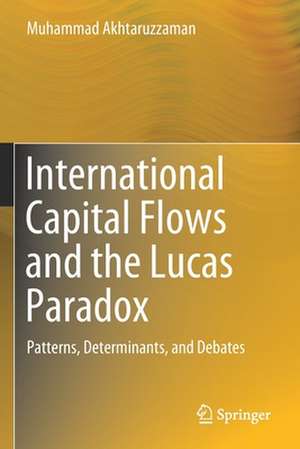International Capital Flows and the Lucas Paradox: Patterns, Determinants, and Debates
Autor Muhammad Akhtaruzzamanen Limba Engleză Paperback – 14 aug 2020
A rigorous quantitative approach is subsequently used to provide clear empirical evidence on the determinants of capital flows across borders. The findings of this empirical analysis suggest that generous economic policies on capital account convertibility are more influential than differences in institutional quality in terms of determining international capital flows. In closing, the relative importance of various types of political risk (e.g. expropriationand corruption) is examined. After determining that expropriation risk has one of the greatest effects on foreign direct investment (FDI), the book proposes an appealingly intuitive explanation for the lack of FDI flows to many capital-scarce developing countries.
| Toate formatele și edițiile | Preț | Express |
|---|---|---|
| Paperback (1) | 636.63 lei 6-8 săpt. | |
| Springer Nature Singapore – 14 aug 2020 | 636.63 lei 6-8 săpt. | |
| Hardback (1) | 564.76 lei 38-44 zile | |
| Springer Nature Singapore – 4 iul 2019 | 564.76 lei 38-44 zile |
Preț: 636.63 lei
Preț vechi: 748.97 lei
-15% Nou
Puncte Express: 955
Preț estimativ în valută:
121.82€ • 127.53$ • 100.80£
121.82€ • 127.53$ • 100.80£
Carte tipărită la comandă
Livrare economică 05-19 aprilie
Preluare comenzi: 021 569.72.76
Specificații
ISBN-13: 9789811390715
ISBN-10: 9811390711
Pagini: 203
Ilustrații: XVI, 203 p. 29 illus., 25 illus. in color.
Dimensiuni: 155 x 235 mm
Greutate: 0.31 kg
Ediția:1st ed. 2019
Editura: Springer Nature Singapore
Colecția Springer
Locul publicării:Singapore, Singapore
ISBN-10: 9811390711
Pagini: 203
Ilustrații: XVI, 203 p. 29 illus., 25 illus. in color.
Dimensiuni: 155 x 235 mm
Greutate: 0.31 kg
Ediția:1st ed. 2019
Editura: Springer Nature Singapore
Colecția Springer
Locul publicării:Singapore, Singapore
Cuprins
Chapter 1: Review of the Neoclassical Theory of Capital Flows and Related Empirical.- Chapter 2: The Lucas Paradox: Alternative Estimates of Marginal Product of Capital.- Chapter 3: Estimating the Determinants of Capital Inflows Using Cross-Sectional Data.- Chapter 4: Panel and Non-Linear Models of Capital Inflows.- Chapter 5: Do Foreign Investors Fear Expropriation? Effects of Political Risk on FDI.- Chapter 6: Conclusion.
Notă biografică
Muhammad Akhtaruzzaman is Senior Lecturer at Toi Ohomai Institute of Technology, Rotorua, New Zealand. His research interests focus on international macroeconomics, empirical macroeconomics, development economics, and business and management.
Textul de pe ultima copertă
This book offers a comprehensive analysis of the debates on international capital flows, and presents a new evidence-based answer to the long-standing question of why capital doesn’t tend to flow from rich to poor countries as predicted by standard neoclassical theory – a puzzle known as the Lucas paradox. Further, the book reviews alternative approaches to conventional estimates of the marginal product of capital (MPK) and considers whether these estimates actually help us understand observed international capital flows.
A rigorous quantitative approach is subsequently used to provide clear empirical evidence on the determinants of capital flows across borders. The findings of this empirical analysis suggest that generous economic policies on capital account convertibility are more influential than differences in institutional quality in terms of determining international capital flows. In closing, the relative importance of various types of political risk (e.g. expropriationand corruption) is examined. After determining that expropriation risk has one of the greatest effects on foreign direct investment (FDI), the book proposes an appealingly intuitive explanation for the lack of FDI flows to many capital-scarce developing countries.
A rigorous quantitative approach is subsequently used to provide clear empirical evidence on the determinants of capital flows across borders. The findings of this empirical analysis suggest that generous economic policies on capital account convertibility are more influential than differences in institutional quality in terms of determining international capital flows. In closing, the relative importance of various types of political risk (e.g. expropriationand corruption) is examined. After determining that expropriation risk has one of the greatest effects on foreign direct investment (FDI), the book proposes an appealingly intuitive explanation for the lack of FDI flows to many capital-scarce developing countries.
Caracteristici
Provides a clear answer to the long-standing debate on the determinants of capital flows across borders Presents an evidence-based answer to the question of why capital doesn’t flow from rich to poor countries Suggests clear policy implications for developing and emerging market economies based on robust empirical analysis Investigates the determinants of international capital flows using a large sample of developing and emerging economies
